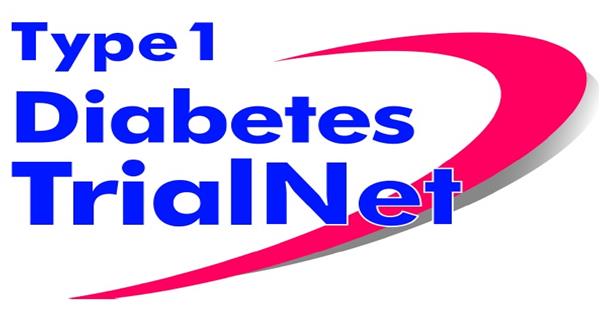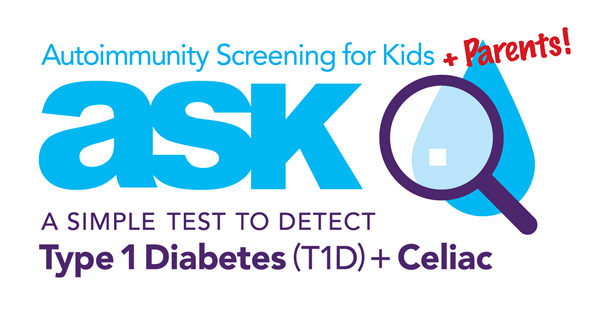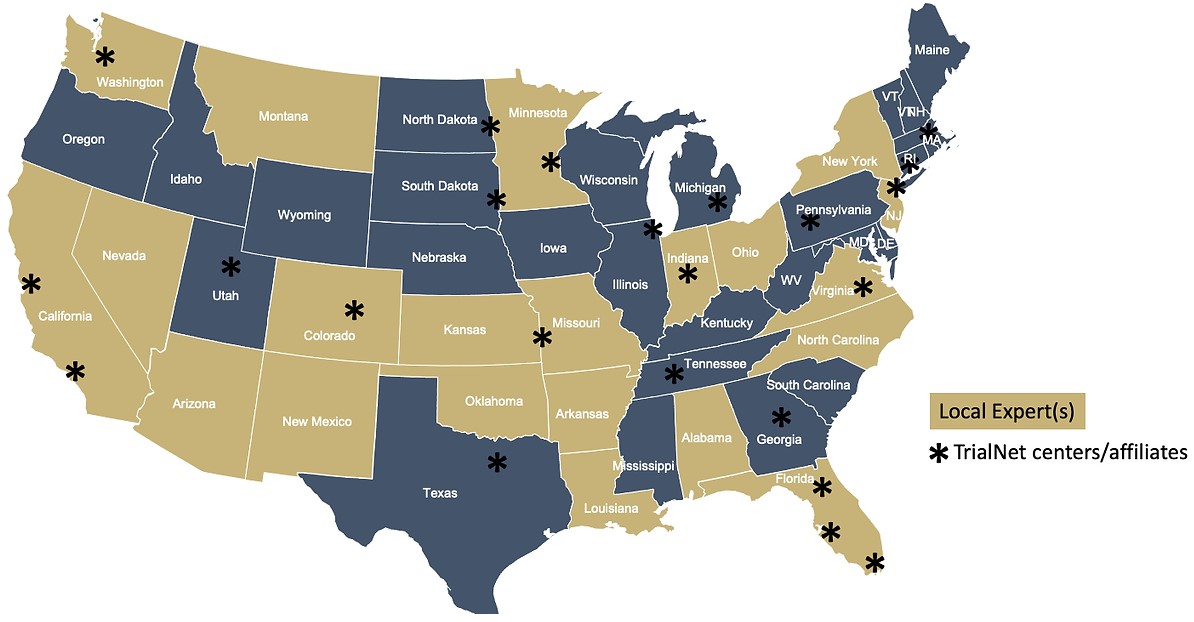Screening for Type 1 Diabetes
Why get screened for Diabetes?
Type 1 diabetes (T1D) is a kind of health problem that can happen to anyone, whether they're a kid or an adult. It occurs when the body's own defense system attacks and destroys the insulin-making cells in the pancreas. As these cells are destroyed over time, the body can't make enough insulin to control blood sugars and get energy. Many times, people are diagnosed when symptoms go unnoticed for too long and they have a life-threatening condition called diabetic ketoacidosis (DKA), which requires treatment in a hospital.
While the diagnosis of T1D might seem surprising, the journey begins long before someone requires insulin or experiences DKA. Months to years before symptoms become apparent, the body starts making type 1 diabetes-related autoantibodies. Checking for these autoantibodies can indicate if you are likely to develop type 1 diabetes during your lifetime. The pace at which this happens varies from person to person. Being aware of your risk can help you monitor for symptoms, have discussions with your doctor, and decide whether you want treatment to delay the onset of type 1 diabetes and the need for insulin therapy if you are eligible.
.jpg?sfvrsn=290640bb_3)
Who should get screened?
Type 1 diabetes (T1D) can happen to anyone, no matter their age, overall health, weight, or how fit they are. Even though having a family member with T1D makes you 15X more likely to get T1D, most people diagnosed each year don't have anyone in their family with T1D. Screening for T1D related autoantibodies can tell you if you are likely to get T1D. There are free T1D screening programs available in the United States.
If you do not qualify for a screening program or are unable to travel to one of the screening locations that participate in the listed programs, you should speak with your pediatrician, primary care, or family doctor. Based on your history and risk level, they may be able to order testing for you at a local diagnostic laboratory.
Screening and Monitoring for T1D

TrialNet
TrialNet offers free screening for personal risk of developing T1D and, for those who screen positive for autoantibodies, offers monitoring for the development of T1D and the opportunity to participate in prevention clinical trials. The screening is available to relatives of those with T1D: between the ages of 2.5-45 years for first degree relatives, and between the ages of 2.5-20 years for 2nd or 3rd degree relatives. Screening is also available to those who are 2.5-45 years and have previously tested positive for at least 1 T1D related autoantibody.

ASK
The ASK (Autoimmune Screening for Kids) program is based out of the Barbara Davis Center at the University of Colorado. It's mission is to increase community awareness of both Type 1 Diabetes and Celiac disease and to reduce the health risks of delayed diagnosis of these conditions. The ASK program offers free screening for both Type 1 Diabetes and Celiac disease for any US children between the ages of 1 and 17, regardless of family history. In person screenings are available in Aurora and should be scheduled in advance.
Additional Screening Resources
If you do not qualify for or are unable to travel to one of the screening locations that participate in the above programs, you should speak with your pediatrician, primary care, or family doctor. Based on your history and risk level, they may be able to order testing for you at a local diagnostic laboratory.
Screening for Type 1 diabetes usually includes the following autoantibody labs:
GAD Autoantibody
IA-2 Autoantibody
Insulin Autoantibody
Zinc Transporter 8 Autoantibody
What's next if you screen positive?
Screening positive for autoantibodies does not necessarily mean that you already have type 1 diabetes, but you should follow up with a doctor or with the screening program to make sure that you don’t need immediate medical attention.
If you do screen positive through ASK or TrialNet, your blood sugars and T1D progression can be followed through the program.
If you screen positive through a laboratory that is not part of a screening program, it is recommended that you:
- Schedule an appointment with your primary care provider. Let them know that you have screened positive for T1D related autoantibodies and ask that they check your blood glucose level and hemoglobin A1c. You may also schedule follow-up with our Early T1D Clinic.
- Obtain follow up lab testing to confirm the positive screening test with a second blood test. This test should include all four T1D-related antibodies (GAD-65A, IA-2A, insulin autoantibody, and ZnT8A).
More information and resources for what to do should you screen positive are available through our Ask the Experts program. This program provides resources for patients and families of patients who have screened positive along with helpful resources for healthcare providers. For patients who are not in Colorado, you may get in touch with a local specialist though the Ask the Experts program should you or your primary care provider need guidance on what to do next or need help scheduling a confirmation antibody test.
Ask the Experts: T1D Info for Families
Barbara Davis Center Early Type 1 Diabetes (T1D) Clinic
The Barbara Davis Center has a special clinic for patients who have screened positive and are in the early stages of T1D. This clinic offers confirmation testing, staging of type 1 diabetes, counseling on treatment options, and long-term follow-up for patients who have screened positive but have not progressed to clinical T1D.
BDC Early T1D Clinic
Ask the Experts
Live outside Colorado and need help finding a specialist?
Our Ask the Experts team has a network of "Local Experts" who can help with monitoring and education.

Our Experts can help you if you have questions about interpreting screening results or determining a follow-up plan.
Email [email protected] or call (303) 724-1212 to speak with a member of the Ask the Experts team.